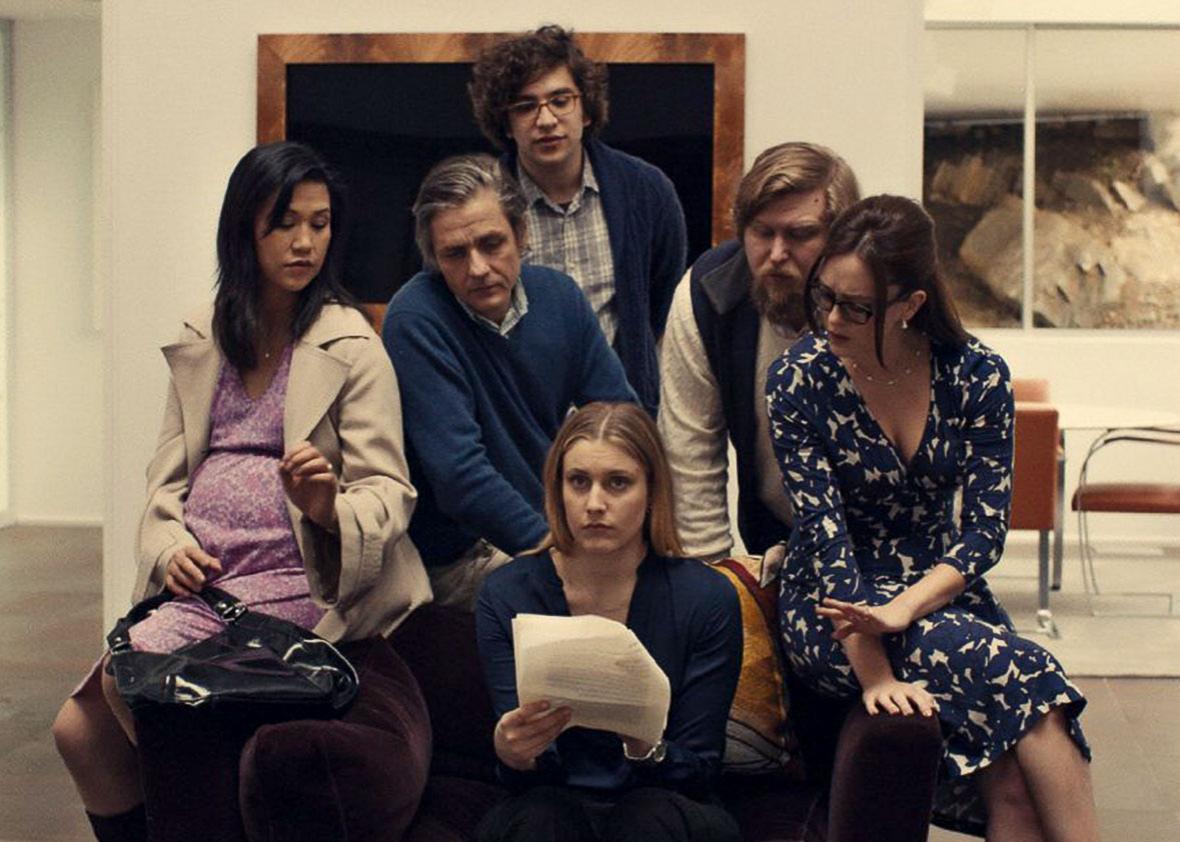The opening scene of director Noah Baumbach’s first movie, Kicking and Screaming—released 20 years ago this fall—took place on graduation night as the final moments of university ticked away. Its central characters were confident seniors, big fish in a little liberal arts pond, loath to leave this mastered domain for the unknown universe beyond.
Baumbach’s new film, Mistress America, dramatizes the exact opposite end of the undergrad experience. We fade in on arrival day at Barnard. Our protagonist is Tracy, a jittery frosh—wary of her classmates, bewildered by the campus social scene, and deeply unsure of herself.
Baumbach nails those first, flop-sweaty days of college with a spot-on montage: Tracy, overcome by buffet abundance, piling her dining hall tray with both pizza and cereal; Tracy vulnerably dropping her stapled short story into a wall-mounted file holder at the student literary mag; Tracy self-quashing a nascent crush when she spots the boy holding hands with someone else in the quad. The frog-voiced young actress Lola Kirke inhabits Tracy’s insecurity with aplomb. It’s a charming opening reel, and the film feels on track to become the wittiest highbrow college comedy since, well, Kicking and Screaming. Until Greta Gerwig happens.
Sitting alone in a diner, alienated from her classmates, feeling desperate (if we weren’t clear on this, Paul McCartney’s “No More Lonely Nights” helpfully plays on the soundtrack),Tracy is driven to phone the one non-Barnard person she knows in New York. It’s Brooke (played by Gerwig), the daughter of Tracy’s mom’s new fiancé. From the moment Tracy meets her stepsister-to-be in Times Square, the Brooke show begins—and the film deflates.
Baumbach and Gerwig, a romantic twosome IRL, collaborated beautifully as co-screenwriters on 2013’s Frances Ha. That bouncy dramedy let Gerwig’s innate sweetness perfectly balance out Baumbach’s bitter edge. Gerwig, as the titular Frances, was a vision of delightful pluck. In Mistress America, Gerwig plays the flip side of Frances: Brooke is antic, but not harmless. And Frances’ pluck has turned dangerously delusional.
Baumbach and Gerwig have both noted in interviews that Mistress America is in part inspired by those 1980s comedies—like Something Wild and After Hours—in which a preppy square falls under the spell of an outrageous bon vivant. Kirke holds up the square end of this bargain, believably portraying Tracy’s sad-sack ennui. But Gerwig doesn’t quite pull off the Auntie Mame counterpoint. She’s a supremely likable actress, to be sure, but she lacks the lightning-bolt charisma it would require to be convincing as a figure Tracy gloms onto out of rapt fascination. Brooke’s array of downtown hijinks are neither daffily fun nor darkly subterranean enough to captivate. Maybe that’s the idea: that Tracy is so sheltered, so empty, that even this dim wattage draws her like a moth to flame. But dim wattage is not the stuff of entertaining, antic comedy, which is what Mistress America strives to be.
The disconnect between the movie’s goals and its actual comic energy becomes most evident during a road trip to Greenwich, Connecticut, where Brooke plans to cadge money from an old friend who’s married rich. The movie grinds to a halt as what had been a sharp-eyed campus tale turns into a baggy, failed screwball farce. The script gets stagy, the jokes fall flat, and the manic pacing doesn’t make up the difference. Baumbach has always composed angular, complex dialogue, and has always managed to neatly walk the tightrope between juicy and overwritten. But here the lines get run-on, a little too packed with pretension, and become uncomfortably chewy mouthfuls for his actors.
There are chuckle-inducing moments toward the end of this Connecticut sojourn, when the banter gets flouncier and the mood nearly achieves liftoff. But for the most part, the stabs here at quick-paced, shouty rage come off as second-tier David O. Russell. I yearned for the laugh-out-loud fluidity of, say, Russell’s Flirting With Disaster—a rare example of modern screwball done right.
The film goes back to Barnard for its denouement. And we’re reminded that it never should have left. I’ll watch anything this auteur puts out, and I’m not sorry I watched this film—even Baumbach’s misfires have oodles more verve than the personality-free product Hollywood often puts out. But I can’t help but mourn what might have been: a second Baumbach campus classic just as good as his first.
